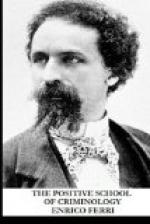In primitive and savage society, when the human personality did not know the check of social discipline, a military discipline held the members of the tribe together. But war, while useful in primitive society, loses its usefulness more and more, because it carries within itself the cancer that paralyzes it.
While war compels collective groups to submit to the co-ordinating discipline of human activity, it also decreases the respect for human life. The soldier who kills his fellow man of a neighboring nation by a stroke of his sword will easily lose the respect for the life of members of his own social group. Then the second educational energy interferes, the energy of labor, which makes itself felt at the decisive moment of prehistoric development, when the human race passes from a pastoral, hunting, and nomadic life Into an agriculture and settled life. This is the historic stage, in which the collective ownership of land and instruments of production is displaced by communal property, family property, and finally individual property. During these stages, humanity passes from individual and isolated labor in collective, associated, co-ordinated labor. The remains of the neolithic epoch show us the progress of the first workshops, in which our ancestors gathered and fashioned their primitive tools and arms. They give us an idea of associated and common labor, which then becomes the great uplifting energy, because, unlike war, it does not carry within itself a disdain or violation of the rights of others. Labor is the sole perennial energy of mankind which leads to social perfection. But if you have 100,000 persons in a city like Naples who do not enjoy the certainty and discipline of employment at methodical and common labor, you need not wonder that the uncertainty of daily life, an illfed stomach, and an anemic brain, result in the atrophy of all moral sentiment, and that the evil plant of the Camorra spreads out over everything. The processes in the law courts may attract the fleeting attention of public opinion, of legislation, of government, to the disease from which this portion of the social organism is suffering, but mere repression will not accomplish anything lasting.
The teaching of science tells us plainly that in such a case of endemic criminality social remedies must be applied to social evils. Unless the remedy of social reforms accompanies the development and protection of labor; unless justice is assured to every member of the collectivity, the courage of this or that citizen is spent in vain, and the evil plant will continue to thrive in the jungle.
Taught by the masterly and inflexible logic of facts, we come to the adoption of the scientific method in criminal research and conclude that a simple and uniform remedy like punishment is not adequate to cure such a natural and social phenomenon as crime, which has its own natural and social causes. The measures for the preservation of society against criminality must be manifold, complex and varied, and must be the outcome of persevering and systematic work on the part of legislators and citizens on the solid foundation of a systematic collective economy.




